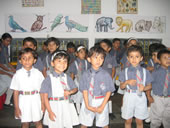Udaipur
At the forefront of the reform movement
More on Udaipur jamaat...
The Udaipur Jamaat has been functioning since 1972 independent of the Kothar. Now that's not a mean achievement! However, what it means in real terms is that the local Bohras have full control over their own affairs; that the Jamaat exists for the welfare of members and not for the benefit of the priesthood; that the Jamaat is accountable to the people; that the people know how the funds are being spent; that the people have the right to question the Jamaat on any issue that they feel Jamaat is not doing right; that life is as it should be - free of Kothar's unIslamic, un-Dawoodi Bohra like fetters.
The Udaipur Jamaat has been striving to put into practice all the ideals - Jamaat elections, accountability etc. - that porgressives demand of the Kothar. This is not to say that we've established an ideal society - but to be in control and to be able to continue unadultrated traditions of Fatimi Dawaah gives us all a great satisfaction. In other words, we've been trying, in our own humble and small way, to set an example for the rest of the Dawoodi Bohra community.
Udaipur Bohras were not always like this, though. In fact they used to be more devout that the present-day Abdes and Amtes. But fortunately, as it were, the tumultous events of the early 1970s set us on the path to revolt and reform. Do take a look at the history of Udaipur reform movement to understand why and how this change came about. In all this, one thing should be clear that it's the common Bohras who pushed for change and it's with their commitment and sacrifice that has nourished and sustainted the progressive movement.
Election
Dawoodi Bohra Jamaat (Reformist Group) is a registered body with it's own constitution. The Jamaat deals with the various affairs of the community. One of its article, Article 8 states that 21 candidates are to be elected by the jamaat members through elections and 11 candidates are to be co-opted by elected members to the General Council. The elected members and co-opted members would then form Executive Committee from amongst themselves. The executive committee consists of: -
History of revolt
- History of the reform movement in Udaipur - part 1
- History of the reform movement in Udaipur - part 2
- History of the reform movement in Udaipur - part 3
- History of the reform movement in Udaipur - part 4
- History of the reform movement in Udaipur - part 5
- History of the reform movement in Udaipur - part 6
- History of the reform movement in Udaipur - part 7
- One Chairman
- Two Vice Chairmen
- One Secretary
- Two Joint Secretaries
- One Treasurer
- One Accountant
- Three general members
The election process has been adopted by the Dawoodi Bohra Jamaat from since the early 70s.
Following are the stages of the electoral process:-
Preparation of electoral rolls
Before every election after a house-to-house visit, the names of the Jamaat members who are of 18 yrs. of age or above are listed in order to prepare the electoral rolls. These electoral rolls are then published in draft for inviting claims and objections. Then after the final corrections the rolls are published and are used for the General Election.
Notice of election
Similar to the process of Assembly/Parliamentary Elections in India, the notice of election is issued by the Election Convener containing the last date of receipt of nomination papers, scrutiny and withdrawals of nomination papers. Thereafter if the number of contesting candidates is 21 or less, all the candidates are declared elected to the General Council, if not then the list of contesting candidates is published and elections are held. In case of a contest polling is held for 8 hours and counting of votes is started after the polling has ended.
Formation of polling/counting parties
In order to have a free and a fair election process, the polling and counting parties are formed of the Non-Bohra election experts. The elections are held using the secret ballot. The voters are trained to mark the ballot paper. The voters are supposed to choose 21 candidates from the ballot paper. Ballot papers with more than 21 markings are considered invalid and rejected.
The District Administration provides police personnel at the polling station for maintaining law and order on the request of election convener. The contesting candidates before the date fixed for the actual polls are allowed to print dummy ballot papers for canvassing. On the day of polling they are allowed to set up their camps outside the polling station for issuing identity slips on which they are allowed to show the electoral number, the serial number of the voter, name of the voter, polling station number, without any election slogan.



